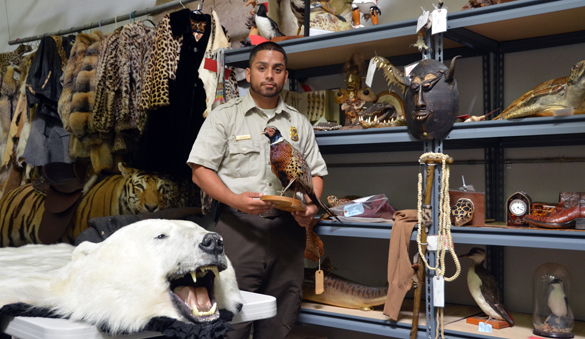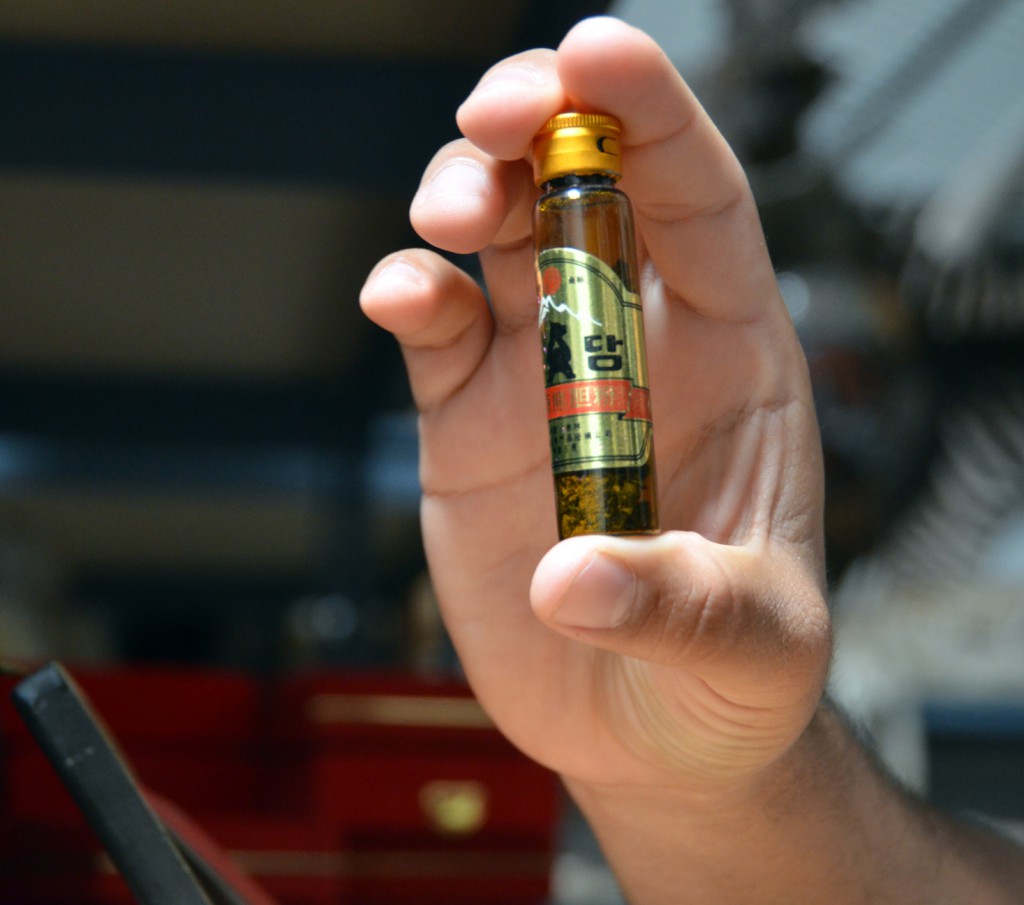As an anthropology major at California State University, Dominguez Hills, Juan Ramirez has learned the value of understanding beliefs that in one culture may be the norm but to another may seem strange. However, through his internship with the U.S. Fish and Wildlife Service as a wildlife inspector trainee who patrols the Los Angeles and Long Beach ports, he has had to acknowledge when the law is broken by the trade of products made with endangered animals – products that are often based on cultural superstition or practice.

“When I started as a criminal justice student, it was black and white,” he says. “The law dictates what’s wrong. Then when I got into anthropology, I realized there were cultural practices associated with certain wildlife products. We have to take custody of these products because they are in violation. But as far as using discretion, I have a better understanding of why certain wildlife products are being imported.”
In a warehouse at the agency’s Torrance facility, Ramirez picks up a silver-embellished box made from what appears to be a primate skull, an object he says is usually imported from Southeast Asia.
“These are made from a species of macaque,” he says. “This is for decorative purposes, and it might have some kind of cultural meaning. That’s one of the interesting things for me, finding a chance to connect it with people and not always judging from my first impression.”
Another area where cultural beliefs can raise ethical questions about protected species is the monitoring of alterative medicines from Asia. Ramirez indicates a vial of dried bear gall bladder from China.
“It has a lot of medicinal properties, so people put it in drinks or use it in [heat] patches,” he says. “It is said to cure anything from arthritis to a headache, to just pain in general. It promotes longevity. It’s an acid from the gall bladder, in crystallized form. Often foreign imported medicines are mislabeled, but in this circumstance the vial is labeled to contain bear.”

Ramirez says that he has picked up some comprehension of Chinese from having to recognize the characters that label medicinal ingredients–some of which are not illegal animal products.
“It’s getting a little harder because a lot of the stuff is mislabeled,” he says. “One of the things I’ve picked up from studying Mandarin is the characters for ‘artificial.’”
Ramirez displays other items, including ocelot coats, ground tiger bone, beads made from pulverized reef coral, sea turtle boots, sport hunting animal trophies, and beluga caviar. He says that while some trade in exotic animal products is sanctioned, the laws vary depending on how a species is regulated.
“Most of these animals are endangered and or highly protected,” Ramirez notes. “But more importantly they have been poached. These are all coming from the wild, so it’s impacting wildlife populations.
“There are, of course, legal ways for business to occur with special permits because the protection status [on some animals] allows for legal trade,” he says. “Certain commercial practices are allowed. But it has to be all done correctly. The reason special permits are used is to control illegal trade.”
Ramirez, a graduate of Redondo Union High School, attended Cypress College to play soccer before transferring to CSU Dominguez Hills in his junior year. While exploring a possible career in the California Department of Fish and Game, he spoke to Marie Palladini, his public administration professor, who retired from the U.S. Fish and Wildlife Service in the Torrance offices as a resident-agent-in-charge. She suggested that he look into the agency’s internship through the Student Career Experience Program (SCEP) administered through USAJOBS. A paid participant in the SCEP program, Ramirez says that he hopes to be hired on as a permanent wildlife inspector after graduating this fall.
“It’s a great way for college students to be able to determine if they can handle the job,” he says of his experience. “And it’s a great way for government or state agencies to recruit students.”
After several years of gaining more experience as a wildlife inspector, Ramirez hopes to work his way up to becoming a special agent.
“We regulate everything from terrestrial [wildlife] to the sea,” he says, holding a piece of baleen from a whale belonging to the suborder Mysticeti. “The knowledge that some of these inspectors have who have been on [the job] for 30 or more years is incredible.”
Ramirez values having been taught by practitioners like Palladini, Gus Martin, a lawyer and expert on terrorism, and Brent Becker, a sheriff in Orange County. He says however that the ability to experience a “real world” working situation while still a student is invaluable.
“Being a great student helps transition you to being a productive employee,” he says. “When you come to a job like this, you have to be able to deal with people, be able to use a lot of discretion, and make judgment calls on the fly.
“You take the tools you can from school and apply them, but what’s most important is your work ethic,” Ramirez says. “Other students that have done internships with me ask, ‘Aren’t you afraid you’re going to make the wrong call?’ Sometimes I do, but I turn it into a learning experience.”